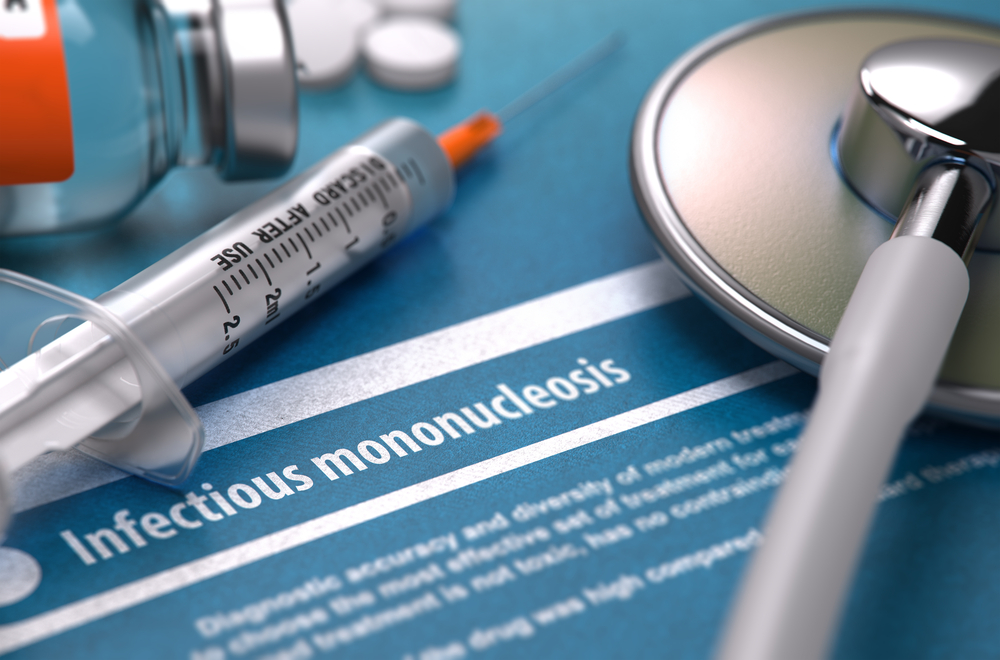Getting mononucleosis is no fun. Take it from someone who has been there, lying in a hospital bed, sleeping only with the help of prescribed painkillers, and getting all her fluids from an IV drip. Here is what you need to know.
You’ve probably heard of it before by the rather unscientific name of “the kissing disease.” Mononucleosis, or mono for short, is a contagious disease that tends to run rampant on college campuses. It is spread through the sharing of bodily fluids (hence, kissing disease). The truth is, though, that kissing someone who is sick is a) never a good idea, b) likely to transmit other diseases besides mono, such as the common cold, and c) not the only way that mono is transmitted.

Antonio Guillem / Shutterstock.com
It’s really easy to get mono. How many of you have shared a drink with another person or stolen a bite of your friend’s dinner and eaten from his fork? I am definitely guilty of both of those things. Ever borrowed someone else’s toothbrush? Shared a hot dog at a baseball game? You guessed it. Mono. Not only is mono transmitted through saliva, but also through blood (transfusions and organ transplants have been linked to the disease). So, steer clear of sick people, don’t share cups, and please never share a toothbrush.
Mono is actually most often caused by the Epstein-Barr virus. This is one of those viruses that the majority of people have but don’t often know about. Over a quarter of college-aged students who get infected with the Epstein-Barr virus will develop mono. What makes the Epstein-Barr virus really fun is the fact that once you have it, it tends to stay in your system even if you’re not displaying any symptoms. Luckily, once you’ve gotten over the initial bout of mono, the virus doesn’t tend to affect you any more (like chicken pox), but if it becomes active again, you will once again be contagious.

Tashatuvango / Shutterstock.com
How do I know if I have mono?
If you’ve been in contact with someone who has developed mono, be on the lookout for the following symptoms:
- Fever
- Sore throat
- Swollen lymph nodes
- Swollen tonsils
- General exhaustion
- Rash
- Swollen spleen
The incubation period between exposure and the appearance of symptoms is generally four to six weeks, meaning that by the time you have mono, you probably have no idea why you have it. Furthermore, most of these symptoms are not individual to mono. A combination of fever, sore throat, and swollen lymph nodes and tonsils could just as easily describe the flu or strep throat. When you’re sick, you tend to be tired anyway, so even being tired may not be the best clue.
Your best bet to determine the cause of your illness is a visit to your doctor. Strep throat has a simple test that can be run during an office visit. There are tests for mono (antibody tests and white blood cell counts), but doctors can typically diagnose it without having to sample your blood.
What do I do once I’ve been diagnosed with mono?
There is no treatment for mono. And, here’s the kicker: it can last from two weeks to six months. The best things that you can do to get healthy are to drink plenty of clear, nonalcoholic fluids (water, tea, broth), sleep as often as your body tells you to, and take Tylenol or Advil to control pain and to lower your fever.
Additionally, you need to avoid playing contact sports until you’re given the all clear by your doctor. Having a swollen spleen is a side effect of mono, and if you play contact sports before it’s back to normal, your spleen could rupture. If you’ve ruptured your spleen, you’ll feel a sharp pain in the upper left quadrant of your stomach. This is incredibly serious, and you’ll need to go to the hospital for emergency surgery. Trust me on this: emergency surgery isn’t any fun and it’s better to just wait until you’re healthy.
What if the pain is so bad that I can’t swallow any fluids or sleep even though I’m tired?
Unfortunately, this can happen. It happened to me. You have a couple of choices. You can go straight to the emergency room, cry to a doctor about how miserable you are, and get prescribed oxycodone for the pain and intravenous steroids to reduce swelling (which is what I did). You could also try the health clinic at your school or pay a visit to your primary care physician (both of whom may direct you to the ER, but it’s worth a shot).
What about classes?

Monkey Business Images / Shutterstock.com
If you are unlucky enough to get a severe case of mono during the school year, the first person that you’re going to want to email is the dean of student affairs. Some schools have a dean in charge of each class year, and some have deans based on department, but regardless, this person is going to be able to help you figure out a course of action. The dean may email professors on your behalf, or you can email them and ask for extensions on any assignments that you might have.
I came down with mono at finals time my freshman year. The dean called me when I was in the hospital, asked what she could do, and emailed my professors on my behalf. Since my finals happened to be papers and no big tests, all of my professors granted extensions and said that I could submit my papers during the first month of summer break if I needed to. I ended up getting them all done before I left campus, after I was released from the hospital. It was nice to be given the option, though.
Colleges have been dealing with outbreaks of mono for years. I was certainly not the only freshman who got it in the spring of 2009. Mono is almost like a rite of passage, so if you do get it, be aware that your school will work with you. It’s an illness, not a vacation period.
Is there anything else to watch out for?
The Epstein-Barr virus can cause other illnesses besides mono, but it is often limited to people who are already immunocompromised. As always, you know your body best. If you think that there is something new or strange going on, see your primary care physician for a full exam.
-
15 Ways to Avoid Gaining the Freshman 15
-
Everything You Need to Know about Date Rape Drugs
-
How to Help a Friend with a Drug or Alcohol Dependency
-
About Greek Life and Sexual Assault on College Campuses
-
How to Respond to Cyberbullying
-
Surviving Homesickness as a Freshman in College
-
The Truth: Why You Should Get Fit to Finish the School Year
-
Should I Take the Student Health Insurance or Stay on a Parent’s Plan?
-
What You Need to Have If You’re Walking Alone at Night
-
How to Avoid Burnout in All Areas of Your Life
-
Put Your Insomnia to Rest: Sleeping Well in Times of Stress
-
Getting Nutrients from Your Meal Plan

